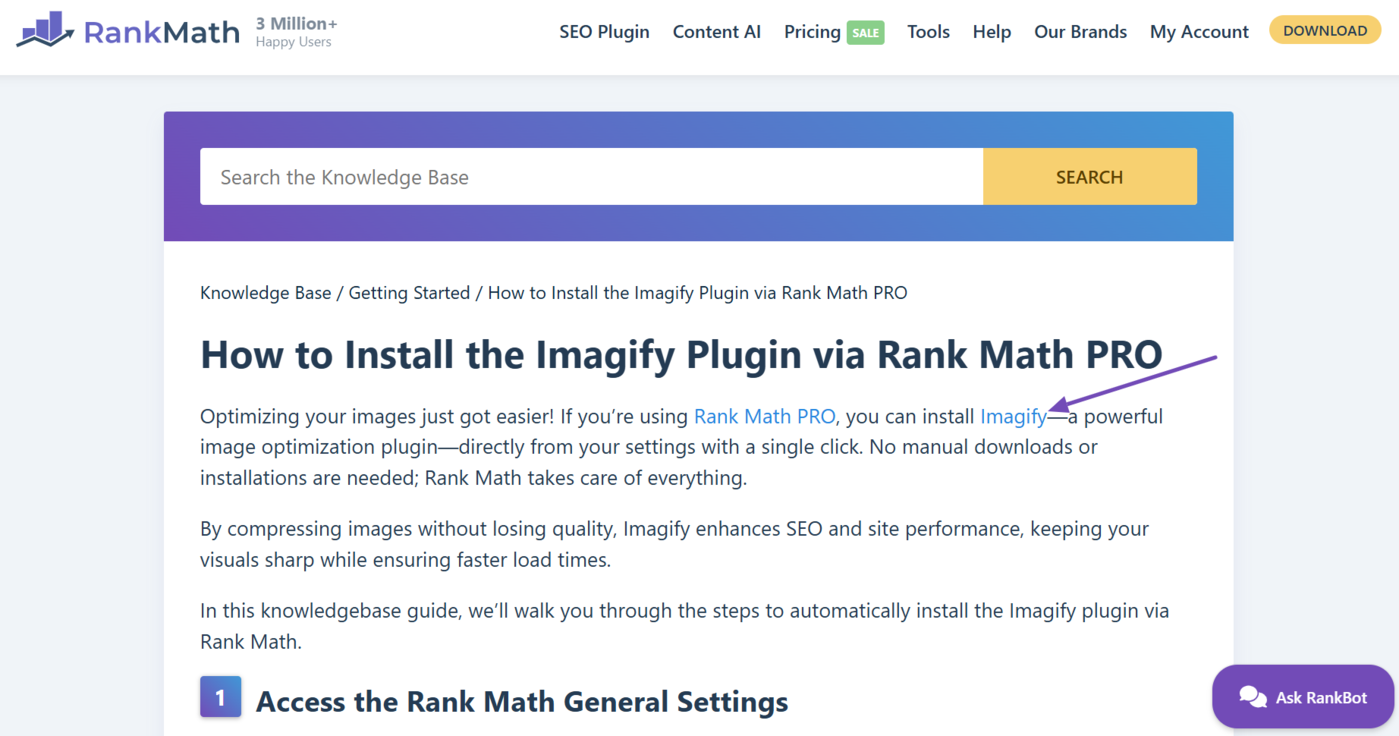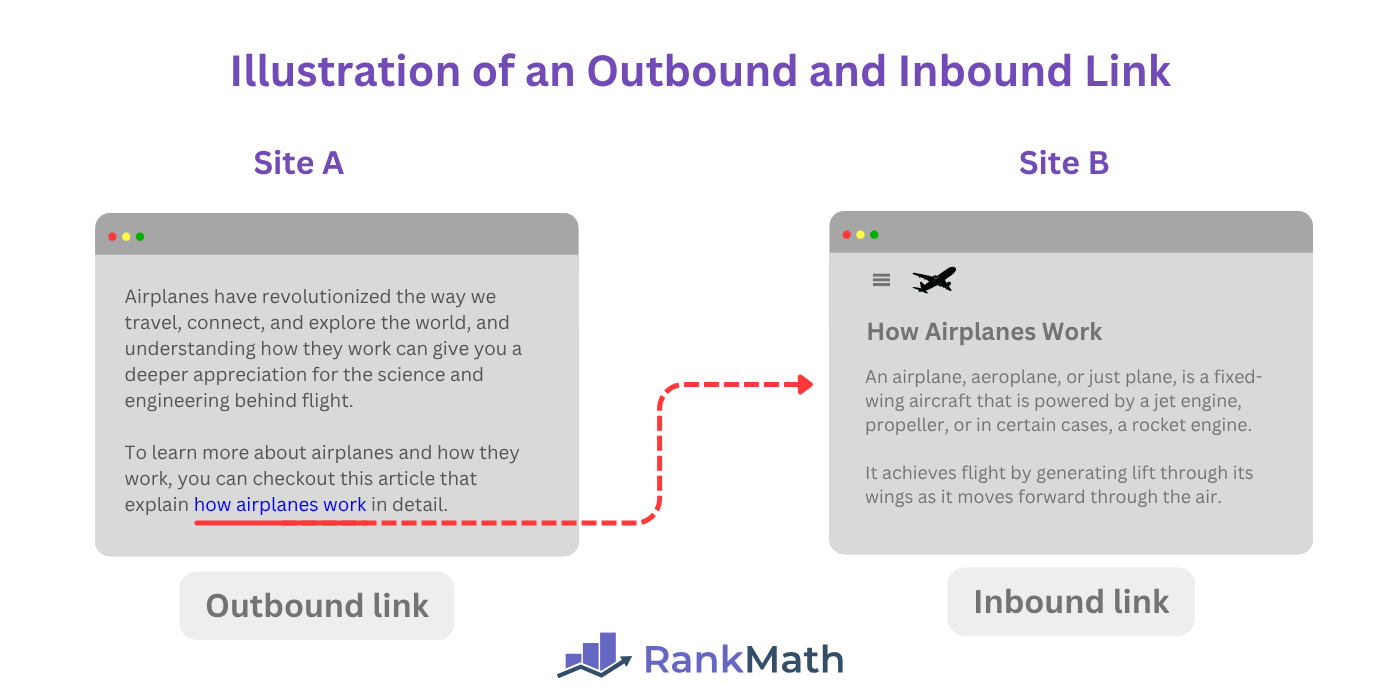What Is an Outbound Link?
An outbound link is a hyperlink that points from one website to another. It is also called an external link. Outbound links typically point to webpages, images, videos, and documents on another site.
For example, this hyperlink points from our site to another site. In this case, the hyperlink is an outbound link (or an external link) for us. However, it is an inbound link (also called a backlink) to the site receiving the link.

In this article, we’ll cover:
Importance of an Outbound Link
Outbound links are important because they connect your content to other relevant and credible sources on the web. This strengthens your site’s authority and trustworthiness.
It also signals to search engines that your content is well-researched. This indicates reliability, which can indirectly enhance your SEO by signaling expertise and relevance.
However, outbound links themselves do not directly boost your rankings in the long run. Instead, they mainly improve ユーザーエクスペリエンス, trust, credibility, and engagement.
They also help search engines better understand the context of your content. It is worth noting that outbound links primarily benefit the site you are linking to, as they count as a backlink that can directly influence the site’s rankings and authority.
Outbound Links vs. Inbound Links vs. Internal Links
Outbound, inbound, and internal links are three types of links on the web. In this case, they are categorized based on the direction they point in relation to your website.
- Outbound links originate from your website and point to another website
- Inbound links originate from another website and point to your website
- Internal links originate from your website and point to another page on your website
This illustration shows a hyperlink pointing from Site A to Site B. Site A considers the link an outbound link while Site B, which receives the link, considers it an inbound link, which is also known as a backlink.

In summary, all three types of links (outbound, inbound, and internal) benefit your rankings and user experience. Here is how they do so:
- Outbound links reference sources that provide additional context to your visitors
- Inbound links signal authority, trustworthiness, and popularity to search engines
- Internal links guide users and search engines to your important content and help them to navigate your site
Common Misconceptions About Outbound Links
There is some misunderstanding about outbound links. Some bloggers include them excessively, believing they improve SEO, while others are overly cautious or avoid them entirely over concerns that they may hurt their rankings.
Nonetheless, here are a few facts to clear the misconceptions.
1 Outbound Links Make Google Rank You Higher
Some bloggers believe that linking to other sites will improve their rankings. In reality, outbound links do not directly boost rankings. Instead, they enhance the user experience by guiding visitors to relevant content.
Overall, outbound links alone will not improve a site’s rankings, but they contribute to a better user experience.
2 Outbound Links Harm Your SEO Efforts
Outbound links do not hurt your SEO. Instead, they improve your user experience and enhance your credibility and trustworthiness with your visitors.
Issues can only rise when you link to spammy, low-quality, or irrelevant sites or engage in practices that violate Google Search Essentials spam guidelines. In such cases, Google may issue a manual action penalty against your site and demote your rankings on search engine results pages (SERPs).
3 Outbound Links Dilute Your PageRank
Many bloggers believe outbound links dilute their ページランク. For this reason, they refuse to link out to other sites. Those who do may also use nofollow links to avoid passing リンクエクイティ and PageRank to the site receiving the link.
For clarity, outbound links do not dilute your PageRank. Instead, it shares a portion of your PageRank with the site receiving the link.
This act does not hurt your SEO or rankings. Instead, it conforms with the fundamental structure of the web, where every website links to other sites and also receives links from other websites. A site should have a healthy balance of outbound and inbound links.
Outbound Links Best Practices
Outbound links can improve your user experience and credibility. Here are some tips on using them effectively.
1 Only Link to Authoritative Sources
Always link to well-established, trustworthy, and credible websites with proven expertise in their field. Doing so builds trust with both users and search engines.
Linking to authoritative sources also enhances your credibility, positions your website as a reliable reference, and reduces the risk of violating Google’s spam guidelines, which can negatively impact your rankings.
When adding the links, ensure to place them naturally within sentences where they are relevant and provide value. Avoid clustering them at the end or inserting them in irrelevant sections.
2 Only Include Relevant Outbound Links in Your Content
Outbound links should directly relate to the topic being discussed on both sites. Irrelevant links can confuse readers and damage your credibility.
They may also signal link spam activities, which can cause Google to issue a manual actions penalty against your site and lower rankings on search results pages. In extreme cases, Google may even remove your content completely.
3 Always Use Descriptive Anchor Text
Ensure to always use descriptive anchor texts that clearly describe what the linked page is about. Such anchor texts should be brief and include clear, relevant キーワード that enable users and search engines to understand the content of the webpage receiving the link.
Make sure to avoid vague phrases like “click here” or “read more.” You should also avoid pasting the naked URLs, as they are not great for your user experience.
4 Always Open Outbound Links in a New Tab
You should open your outbound links in a new tab. This helps to maintain engagement, reduce 直帰率, and prevent users from leaving your site when they click the link.
Opening an outbound link in a new tab is also a great choice for user experience purposes, as some visitors still likely want to remain on your site after clicking on the link to the external site.
5 Always Link to Original Sources
Always link to the primary or original source of information rather than a secondary site that references the primary site. This shows accuracy, honesty, and respect for content ownership. It also improves the quality of your references and increases your audience’s trust in your content.